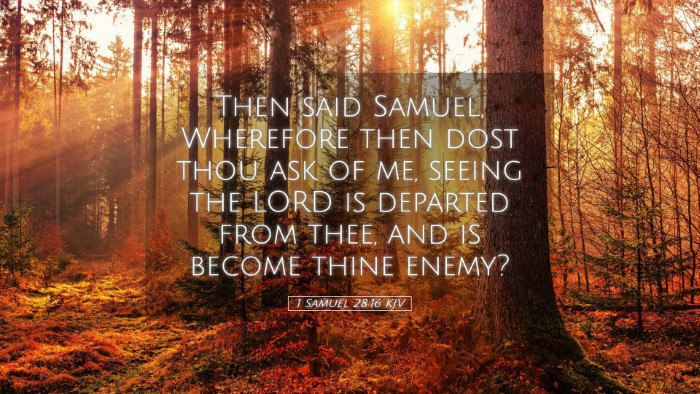Commentary on 1 Samuel 28:16
Verse: "And Samuel said, Why then dost thou ask of me, seeing the LORD is departed from thee, and is become thine enemy?" (1 Samuel 28:16, KJV)
Introduction
This poignant verse occurs in a significant narrative where King Saul, in desperation, seeks guidance from the deceased prophet Samuel through a medium. The complexities of this desperation reveal deep spiritual truths about the relationship between God, His chosen leaders, and the consequences of disobedience.
Contextual Background
The historical context of 1 Samuel 28 is one of decline for Saul. Having been the Lord's anointed, he progressively turned away from divine commandments (1 Samuel 15). As Samuel had pronounced God's judgment against Saul, the king's downfall had begun, evident in his increasing isolation and the loss of God’s favor, leading to his fateful encounter with the witch of Endor.
Matthew Henry's Commentary Insights
Matthew Henry highlights the gravity of Saul's situation, noting that his inquiry to Samuel reveals a profound understanding of his estrangement from God. Henry writes that Samuel’s response encapsulates an moment of divine justice, a reminder that Saul had forsaken God, leading to his current dire predicament.
- Divine Withholding: Henry reflects on the notion that God had withdrawn from Saul due to his persistent disobedience.
- Consequences of Sin: The emphasis on Samuel’s inquiry reflects the fatal consequences of sin that leads to spiritual death.
Albert Barnes' Commentary Perspectives
Albert Barnes emphasizes the theological implications of this verse. Barnes points out that Saul’s desperation led him to seek out forbidden practices, including necromancy, which further alienated him from God.
- God's Silence: Barnes notes that the silence of God in response to Saul's plight illustrates God’s rejection of those who turn away from Him.
- Samuel’s Authority: By questioning Saul's motives, Samuel affirms that true guidance comes from a right relationship with God, not through illicit means.
Adam Clarke's Exegesis
Adam Clarke provides a detailed exegetical perspective on this verse, analyzing the implications of Samuel’s words. He points out the irony of Saul's situation: having rejected God's voice during his lifetime, he now seeks counsel from His prophet.
- Spiritual Blindness: Clarke elaborates on how Saul’s actions reflect spiritual blindness—seeking guidance from the dead while ignoring God’s commands.
- Nature of Prophecy: He emphasizes that true prophecy and guidance are contingent upon the active presence of God, which Saul forfeited through his choices.
Theological Reflections
This passage unfolds significant theological reflections pertinent to both the historical and contemporary church:
- God’s Faithfulness: God’s withdrawal from Saul stands in contrast to His faithfulness to those who earnestly seek Him. Despite Saul’s abandonment, God continues to call for a return to Him.
- Human Desperation: Saul’s act of consulting a medium speaks to the lengths to which humans may go in desperation, often seeking the miraculous without first pursuing God through prayer and repentance.
- Consequences of Leadership: Leaders within the church must heed the words of Samuel; their choices have far-reaching consequences not only for themselves but also for their congregations.
Practical Applications
The lessons derived from 1 Samuel 28:16 are manifold for pastors, students, theologians, and scholars:
- Maintaining Relationship with God: Prioritize an authentic relationship with God as foundational for all aspects of ministry and life.
- Discernment in Leadership: Leaders must exercise discernment and humility, understanding that their relationship with God impacts their spiritual authority.
- Warning Against Desperation: Be mindful of the dangers of seeking answers through means contrary to God’s word, especially in times of crisis.
Conclusion
1 Samuel 28:16 serves as a sobering reminder of the realities of divine judgment, the complexities of human choices, and the unfathomable grace of a God who, despite rejection, continues to call His people back to a place of communion with Him. The reflections from Matthew Henry, Albert Barnes, and Adam Clarke offer vital insights into understanding this text, underscoring its importance for both ancient and modern believers.


